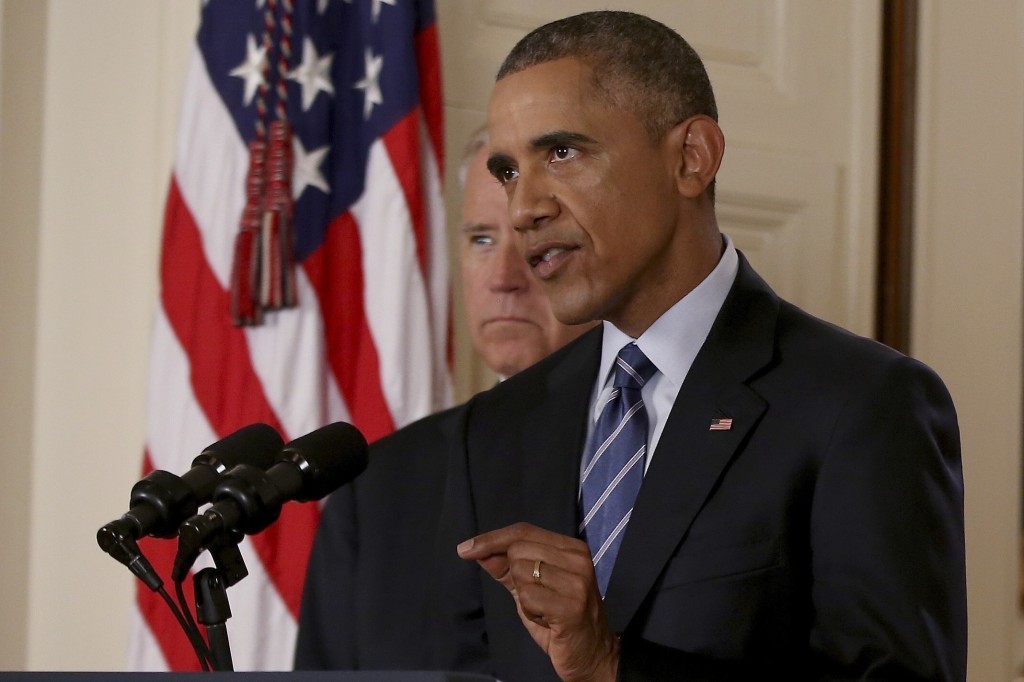
Speaking in a city where air pollution is often visible and palpable, U.S. President Barack Obama challenged governments and businesses in Asia-Pacific nations to keep up efforts to cut emissions that cause climate change.
The president’s call to action, delivered to executives from some of the world’s biggest companies at the Asia-Pacific Economic Cooperation forum in Manila, was made in anticipation of talks in Paris starting late this month intended to deliver binding targets for each nation to cut carbon emissions.
“Few regions have more at stake in meeting this challenge,” Obama said at the summit, after a meeting earlier Wednesday with Philippine President Benigno Aquino.
Obama argued that slowing or halting climate change will benefit corporate bottom lines by opening new avenues for investment in renewable energy and other green technology. He also framed the issue as a security concern for Pacific rim nations that face greater flooding, violent storms and drought under the effects of climate change.
Infrastructure Resiliency
That topic has been on the agenda at the summit. Philippine Foreign Affairs Secretary Albert del Rosario on Tuesday said ministers from the 21 member countries of APEC are working on plans to increase the resiliency of energy infrastructure to natural disasters.
Obama used last year’s APEC summit as the backdrop for the U.S. and China to unveil a landmark agreement on cutting greenhouse-gas emissions. The U.S. and China, the world’s two biggest economies, account for more than a third of global greenhouse gas emissions, and their pledges gave added momentum toward an agreement at the United Nations climate talks on Nov. 30.
“An ambitious agreement in Paris will prompt investors to invest in clean energy technologies because they will understand that the world is committed” to a clean energy future, Obama said on Wednesday.
He praised Jack Ma, chairman and co-founder of Chinese online commerce giant Alibaba Group Holding Ltd., for his commitment to acting on climate change and cited American companies Google Inc., Apple Inc. and Costco Wholesale Corp. as among the world largest users of renewable energy. The two shared the stage at the summit.
Resistance at Home
As he seeks to build a consensus on climate change among world leaders, Obama faces resistance back in the U.S.
Republicans, who control both chambers of Congress, are seeking to prevent the administration implementing limits on greenhouse gas pollution from power plants, which would force broad changes in the way electricity is produced and delivered and are central to Obama’s climate agenda. Hours before Obama spoke in Manila the Senate passed a resolution to block the rules. The president has vowed to veto the measure.
Obama is scheduled to meet for the first time this week with new Canadian Prime Minister Justin Trudeau. The president announced earlier this month he was rejecting a permit to allow a Canadian crude oil pipeline to be built in the U.S. on the grounds the project would worsen climate change by encouraging the use of fossil fuels.
‘Dirty Oil’
Trudeau on Tuesday said Canada’s environmental record is in part to blame for Obama’s “dirty oil” rhetoric that he used when talking about the oil sands production that would have sent crude through the Keystone pipeline.
Climate change was raised by other leaders at APEC, including Aquino, whose country is often lashed by strong typhoons. Haiyan, the most powerful storm known to make landfall, killed more than 6,000 people in the Philippines and washed away parts of the city of Tacloban in November 2013.
“As a country highly vulnerable to climate and disaster risks, the Philippines underscores the importance of all countries contributing to the global effort to address the problem of climate change for the benefit of future generations,” Aquino said during a joint press conference with Obama. Indonesian Vice President Jusuf Kalla told APEC he hopes the Paris meetings make good progress.
Trade Pact
At the summit, Obama is also drumming up support for the Trans-Pacific Partnership trade pact, as all 12 nations that signed it now need to get approval from their respective parliaments. Obama has a tough process in the U.S. if he is to succeed, and he’s pressing other nations that signed the agreement to ratify it so it can take effect.
“There is not a trade deal that’s been done in modern American politics that has not been challenging, but I’m confident it’s going to get done,” Obama said after his meeting with Aquino.
Discussions at APEC were overshadowed by the attacks by Islamic State extremists last week in Paris that killed at least 129 people, as leaders grapple with how to battle extremism at home and abroad.
“We will not allow terrorism to threaten the fundamental values that underpin our free and open economies,” APEC leaders will say at the end of their summit on Thursday, according to a draft of their communique obtained by Bloomberg. “Economic growth, prosperity, and opportunity are among the most powerful tools to address the root causes of terrorism and radicalization. We stress the urgent need for increased international cooperation and solidarity in the fight against terrorism.”
